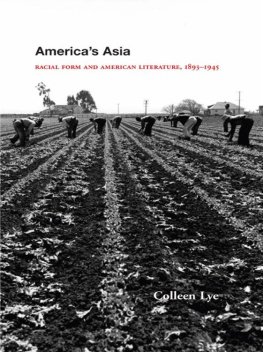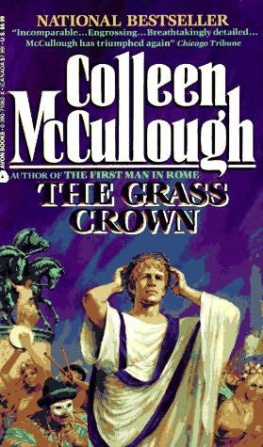Colleen Lye - Americas Asia
Here you can read online Colleen Lye - Americas Asia full text of the book (entire story) in english for free. Download pdf and epub, get meaning, cover and reviews about this ebook. year: 2009, publisher: Princeton University Press, genre: Romance novel. Description of the work, (preface) as well as reviews are available. Best literature library LitArk.com created for fans of good reading and offers a wide selection of genres:
Romance novel
Science fiction
Adventure
Detective
Science
History
Home and family
Prose
Art
Politics
Computer
Non-fiction
Religion
Business
Children
Humor
Choose a favorite category and find really read worthwhile books. Enjoy immersion in the world of imagination, feel the emotions of the characters or learn something new for yourself, make an fascinating discovery.
- Book:Americas Asia
- Author:
- Publisher:Princeton University Press
- Genre:
- Year:2009
- Rating:5 / 5
- Favourites:Add to favourites
- Your mark:
- 100
- 1
- 2
- 3
- 4
- 5
Americas Asia: summary, description and annotation
We offer to read an annotation, description, summary or preface (depends on what the author of the book "Americas Asia" wrote himself). If you haven't found the necessary information about the book — write in the comments, we will try to find it.
Americas Asia — read online for free the complete book (whole text) full work
Below is the text of the book, divided by pages. System saving the place of the last page read, allows you to conveniently read the book "Americas Asia" online for free, without having to search again every time where you left off. Put a bookmark, and you can go to the page where you finished reading at any time.
Font size:
Interval:
Bookmark:
Americas Asia
Americas Asia
RACIAL FORM AND AMERICAN LITERATURE, 18931945
Colleen Lye
PRINCETON UNIVERSITY PRESS
PRINCETON AND OXFORD
Copyright 2005 by Princeton University Press
Published by Princeton University Press, 41 William Street, Princeton, New Jersey 08540
In the United Kingdom: Princeton University Press, 3 Market Place, Woodstock, Oxfordshire OX20 1SY
All Rights Reserved
Library of Congress Cataloging-in-Publication Data
Lye, Colleen, 1967
Americas Asia : racial form and American literature, 18931945 / Colleen Lye.
p.cm.
Includes bibliographical references (p. ) and index.
eISBN: 978-1-40082-643-8
1. American literature20th centuryHistory and criticism. 2. American literature19th centuryHistory and criticism. 3. AsiaForeign public opinion, American. 4. AsiaRelationsUnited States. 5. United StatesRelationsAsia. 6. Asian Americans in literature. 7. OrientalismUnited States. 8. Orientalism in literature. 9. AsiaIn literature. 10. Race in literature. I. Title.
PS159.A85L942004
810.9'325dc222004042066
British Library Cataloging-in-Publication Data is available
A portion of chapter 2 was previously published as American Naturalism and Asiatic Racial Form: Frank Norriss The Octopus and Moran of the Lady Letty. Reprinted from Representations, no. 84, by permission of the University of California Press. 2004 by The Regents of the University of California.
This book has been composed in Sabon
Printed on acid-free paper.
www.pupress.princeton.edu
Printed in the United States of America
10 9 8 7 6 5 4 3 2 1
In loving memory of my grandmother, Chia Guat-Goh
Contents
Jack London, George Kennan, and the Russo-Japanese War
Frank Norris, Jack London, and the Critique of Monopoly Capitalism
The Specter of Cheap Farmers and Alien Land Law Fiction
John Steinbeck, Carey McWilliams, and the Liberalism of Japanese-American Internment
Pearl S. Buck, Edgar Snow, and John Steinbeck on Asian American Character
Acknowledgments
THIS BOOK WOULD NOT EXIST were it not for the presence of mentors, colleagues, and friends. Its beginning as a dissertation was overseen by Gayatri Chakravorty Spivak, who demanded, in equal measure, both risk taking and rigor. The late Michael Rogin was a fundamental influence on the books historical passions. Conversations over many years with Lingchi Wang animated its political spirit. The critical intelligence of David Palumbo-Liu, Priscilla Wald, Sam Otter, Cathy Gallagher, Chris Connery, and Rob Wilson steered the project to fruition.
As a graduate student, I was deeply fortunate to have met Jean Howard, Joe Cleary, Rebecca McClennan, Sanjay Krishnan, and Donna Jones, who provided formative examples of intellectual and political commitment. Naifei Ding and Kuan-Hsing Chen have sustained my faith in the continuing possibilities of public intellectual life. As a junior faculty member at Berkeley, I received an ongoing education from colleagues Stephen Best, Kevis Goodman, and Chris Nealon who, though diverse in their specializations, share a fierce dedication to their craft. In his example of social engagement, Chris has also nourished my hope for community. Sam Otter set the standard for professional integrity.
In whole or in part, this book has also benefited from the comments of Mitch Breitwieser, Anne Cheng, Marcial Gonzalez, Dori Hale, Abdul JanMohamed, Kerwin Klein, Josephine Park, Michael Rubenstein, Sue Schweik, and Bryan Wagner. Sharon Marcus read repeated drafts and offered valuable encouragement. For their indispensable support at various critical moments, I am grateful to Sunil Agnani, Rakesh Bhandari, Bob Bruman, Judith Butler, Bianca Calabresi, Robby Cohen, Janadas Devan, Melanie Hahn, Geraldine Heng, Ru Hong, Becky Hyman, Qadri Ismail, Shuchi Kapila, David Kazanjian, Song-Nae Kim, Franco Moretti, Meaghan Morris, Janet Roitman, Somini Sengupta, Pat Sieber, Franoise Verges, Milind Wakankar, Tim Watson, Michelle Wolfson, Sau-ling Wong, Paola Zamperini, and Jia Zhen.
My research was aided by an extraordinary group of undergraduate and graduate students. Misa Oyama, Christine Hong, and Paul Stasi were indefatigable archivists and brilliant interlocutors. Joann Virata, Alec MacDonald, Jean Gier, Ruth Jennison, and Hoang Phan provided further assistance. Throughout the publishing process, I have been guided by the savvy intelligence of my editor at Princeton, Mary Murrell. The steadfast support of Jeff Knapp and Janet Adelman, successive chairs of the English department during my time as a junior professor, helped me secure the resources I needed to complete the book.
Funding for my research was generously provided by the Townsend Humanities Center at Berkeley, the Hellman Family Faculty Research Fund, the UC Berkeley Career Development Grant and Humanities Research Fellowship Program, and the Social Science Research Council MacArthur Program in International Peace and Security. For their help in locating materials, I would like to thank the research librarians at UC Berkeleys Bancroft Library and Giannini Foundation of Agricultural Economics, and the Special Collections and University Archives of the Greene Library at Stanford University.
Diverse opportunities to test my ideas have made this a stronger book. I thank the remarkable student and faculty members of the 20012002 Townsend Fellows Group at Berkeley; the faculty associated with the Center for Cultural Studies at UC Santa Cruz, who repeatedly invited me to share my work with them; the participants in the conference on Borderlands/ Bordercrossings organized by the Asia/Pacific Institute at Duke University, especially Leo Ching and Sucheta Mazumdar; Daniel Monk, who invited me to speak at the conference on Aesthetic States at SUNY Stonybrook; Clifton Spargo, who invited me to join a panel at the Modern Languages Association in Chicago; the members of the Bay Area Labor History Workshop, especially Lisa Rubens; the members of the workshop on Post-Nationalist American Studies at the Humanities Institute at UC Irvine; and the highly engaged participants in the ninth and tenth annual meetings of the SSRCMacArthur Program in International Peace and Security, including Susanne Rudolph, Peter Katzenstein, Rob Walker, Achille Mbembe, Julia Dvorkin, and Lynn Eden. I wish to thank my students, too, for the part theyve played, knowingly and unknowingly, in stimulating my thinking.
The book is dedicated to my grandmother, who believed in me all of her life. There are others as well for whom no words of gratitude can suffice: Cathy Gallagher, for offering me her warmest friendship as well as her immeasurable wisdom; Randall Alifano, for teaching me some fundamentals I ought to have learned long ago; my parents, for their willingness to wait so long for me to finish; Linda Lye, for being my best friend as well as my sister; and David Pickell, for helping me always remain true to myself.
Americas Asia
INTRODUCTION
The Minority Which Is Not One
SOON AFTER I STARTED TEACHING at Berkeley, I was invited to speak in a large student-organized undergraduate English lecture course called Other Voices, a course that exists primarily to introduce lower-division students to minority faculty on the campus. It was suggested by the course facilitators that I talk about my research interests, but that in preparing my remarks I bear in mind that I would be the only Asian American guest that semester. For the students reading assignment I chose a short poem by Mitsuye Yamada, Looking Out:
It must be odd
to be a minority
he was saying.
I looked around
and I didnt see any.
So I said
Yeah
it must be.
I framed my presentation around a reading of the poem, calling attention to the disjuncture between seeing and being seen, to the ambiguity in the speakers response (registered in the gap between sight and speech) that could indicate either a reluctant acquiescence to social construction or an ironization of the others perception. I wanted the students to wrestle with the misunderstanding that arises in the poem: is Yamada playing on the gap between external and internal perception or between different kinds of social perception held by the two people in the poem. I wanted the students to reflect on the kind of sociological and psychic construction signified by the term minority and its relation to questions of visibility, representation, identification, and subjectification. Yamadas poem helped me to kick off an introductory lecture on a central problematic of Asian American identity: the invention of Asian American as a pan-ethnic construction by the yellow power movement of the 1960s, the coalitional character of its structuration, and its limitless tendency toward fragmentation.
Next pageFont size:
Interval:
Bookmark:
Similar books «Americas Asia»
Look at similar books to Americas Asia. We have selected literature similar in name and meaning in the hope of providing readers with more options to find new, interesting, not yet read works.
Discussion, reviews of the book Americas Asia and just readers' own opinions. Leave your comments, write what you think about the work, its meaning or the main characters. Specify what exactly you liked and what you didn't like, and why you think so.













